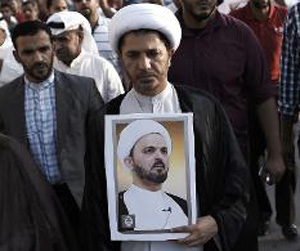Bahrain ‘s sectarian divide deepens to deport a Shiite cleric
Thursday, May 1st, 2014 5:00:27 by Jamshed Sindhu
The Bahraini authorities deported last Shiite cleric Hussein al Najati, whom they accuse of acting as unauthorized representative of Grand Ayatollah Ali Sistani week. The move deepens sectarian conflict began as a peaceful protest for democracy in 2011. Three years later, the vicious cycle of violence and repression polarizes society and threatens to become entrenched. On the eve of the visit of King Juan Carlos Manama, riots every night still shaking Shiite slums surrounding the capital of this small Arab kingdom.
” Hussein al Najati activities exercised unclear and was not coordinated with the authorities,” said the Interior Ministry statement sent by email. According to the text, the authorities “discovered he was a representative of the Shiite leader Ali Sistani ” and ” collected money and distributed ” in its name, which prompted their suspicions.
Al Najati, which supported the popular uprising started in line with the Arab Spring, was stripped of Bahraini nationality in November 2012, with thirty opponents, which drew criticism from human rights organizations. Now, the UN Special Rapporteur on Freedom of Religion and Belief, Heiner Bielefeldt, has rated the deportation of ” intimidation against the Shiites.”
” There is no record of who has advocated violence or use, or who committed acts against national security or public order, has not been charged or convicted of such acts,” said the reporter.
Shiites are two thirds of the population of Bahrain and from the outset constituted the bulk of those demonstrating against the monopoly of power by the royal family. The Al Khalifa, a Sunni dynasty, ruthlessly suppressed the protests, and even gathered the support of his powerful neighbor Saudi Arabia, which sent a thousand troops. Still, they insist on accusing the Shia of ties with Iran, a move that has opened the sectarian divide and polarized society.
“Expulsion of Al exceeds Najati humanitarian and legal limits ” denounced Al Wefaq, the main Shiite political party (parties are prohibited). This group, which defends the activities of the clergy, relates measures “his refusal to condemn the popular movement for democratic transition in Bahrain.”
Since the first demonstrations that mobilized tens of thousands of people, police checkpoints, house searches, arbitrary arrests and indiscriminate use of tear gas have become commonplace in Shiite neighborhoods around Manama. This is where, in the absence of progress in the dialogue pursued Al Wefaq, have draft the violent tactics of the Coalition of February 14 Youth, whose activists are turning to Molotov cocktails and homemade weapons.
Violence gives the impression of being revived in February since the last failed attempt at dialogue between the government and the opposition. At least five people have been killed in the past two months. In March, killing three policemen in an explosion when dispersed a protest in Daih, one of the Shiite slums, led to the authorities to return to accuse Iran of “active involvement” in the crisis. Ensure that trains Bahraini nationals through third parties, in a thinly veiled reference to the Lebanese Hezbollah.
Observers interpreted the deportation of Al Najati in the same context. However, there is paradoxical. As a follower of Sistani, one of Shiite Islam ‘s highest authorities, opposes the doctrine that Iranian clerics supervise the government (velayat -e faqih). The reality is that Bahraini officials have no evidence linking them to Iran, beyond his parents were of Iranian origin, which is the case of many citizens of the Arab kingdom.
The human rights activists, meanwhile, fear that the expulsion of the clergy encourage violence.
“If the government is imprisoning and exiling moderate only get more tension and violence in the streets,” said Nicholas McGeehan, of Human Rights Watch.
At least 89 people have been killed, including 13 policemen, and several thousands more have been detained since the start of the protests, according to the International Federation of Human Rights. Most have been killed by tear gas inhalation and abuses of police vehicles.
Short URL: https://www.newspakistan.pk/?p=43458

















